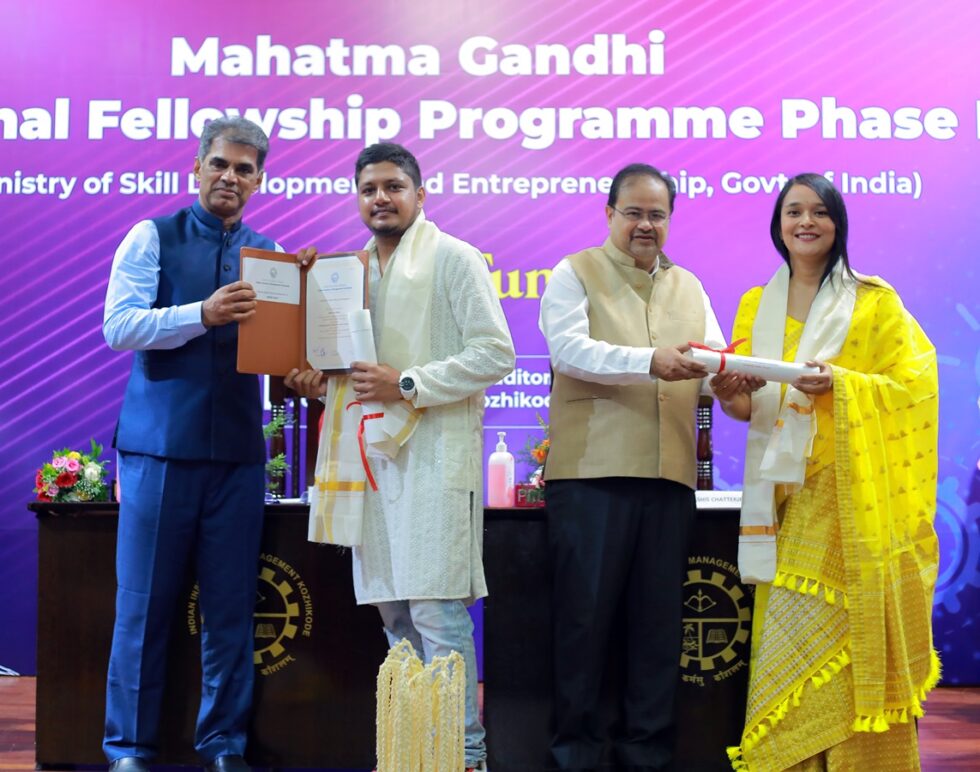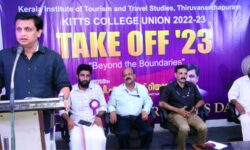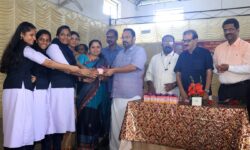
KOZHIKODE:
59 Fellows of the Indian Institute of Management Kozhikode’s inaugural batch of the Mahatma Gandhi National Fellowship (MGNF – Phase II) shone bright as a Valedictory Ceremony held yesterday in the Campus, brought down colourful curtains to their two-year intensive journey. Dr. K. N. Raghavan Director General of National Academy of Customs, Indirect taxes and Narcotics (NACIN) was the Chief Guest for the event whereas Prof. Debashis Chatterjee, Director IIM Kozhikode presided over the function.
The MGNF is a visionary programme of the Ministry of Skill Development and Entrepreneurship (MSDE), Government of India (GoI), managed by IIM Kozhikode. It ingrains academic inputs, workshops, mentoring and extensive field immersions at the District level, that finally culminates in the award of a Certificate in Public Policy and Management to successful participants. The Fellows of IIM Kozhikode were posted in the districts of Chhattisgarh, Kerala, Nagaland, and the NCT of Delhi. The respective State Skill Development Missions (SSDMs) also played an important role in supporting the Fellows’ mission of advancing the development of a skilling ecosystem at their districts.
IIM Kozhikode Fellows also came up with outstanding social projects to benefit the disadvantaged and marginalised sections of the society including Transgender, Tribals, Sex workers, Slum dwellers etc., to help them earn an alternative livelihood. It was befitting that the ‘Scroll Tube’ awarded to the Fellows was produced by the members of Association of Mentally Handicapped Adults (AMHA), in Thrissur district, an initiative supported by one of the MGNF Fellows of the Kerala cohort.
Chief Guest, Dr K. N. Raghavan congratulated the Fellows for the successful completion of this unique programme at IIM Kozhikode and expressed belief that the experience will help them foster excellence in policy making and successful implementation at the grassroots level. Dr Raghavan added “There is huge need to upskill and reskill oneself or have the risk of being left behind, in an age where Artificial Intelligence is challenging the status quo. India has tremendous potential left unexplored in the rural hinterland and tapping grassroot skills will bring in the next talent revolution.” He also emphasized on the importance of practicing sustainability to nullify man’s adverse actions on environment and encouraged the fellows to use their knowledge in improving skillsets creatively and constructively.
Invoking the Father of the Nation after whom the Fellowship is named after, Director IIM Kozhikode, Prof. Debashis Chatterjee, encouraged the cohort to follow the footsteps of the Mahatma who was one of the most ‘resourceful’ managers known to the world. Adding further, he said “IIMK is an institution that enshrines the values of authenticity (Satyam), Sustainability (Nityam) and wholesome thinking (Poornam) in its mission and vision. Collaborative pieces of work by the MGNF Fellows, established on ground realities and innovative approaches aligned to these institutional values. Through this fellowship, IIM Kozhikode has endeavoured to promote a pool of professionals who can combine conceptual knowledge, pragmatism, soft skills, critical thinking, and a sense of purpose to create ground level impact.” He also urged the Fellows to adopt the 3 Cs as they move ahead on their career path – Clarity, Compassion and Commitment.
Additionally, over the course of the Fellowship, the Kerala cohort of MGNF programme Phase-II drafted the “Policy Recommendations for Kerala’s Skilling Landscape” for presentation to the Government of Kerala. This document explores approaches to address some of the pressing challenges related to skill development, livelihoods and employment within Kerala. 15 policy recommendations in the document are the result of meticulous research, data analysis, stakeholder consultations, and a deep understanding of the complex interplay between skills, livelihoods, and employment. The work has been widely appreciated in the circles of public policy management.




